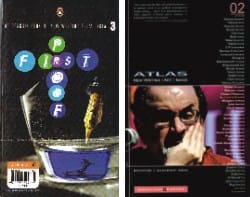<i>First Proof</i> and <i>Atlas</i>

Penguin India's third book of new writing from India showcases some impressive young fictional talent, namely Kishore Valicha, whose short story, 'Strawberries', is a darkly explosive fantasy of sensuality wherein a man wishes to file a complaint against a strawberry-vendor at a police station, who has tricked him into buying fake fruit. He captivates the incompetent police officer with his luxurious tale of strawberries larger and juicier and redder than life that little by little become interchangeable within his unfolding description of the vendor's alleged seduction.
'The Saint of Lost Things' by Joan Pinto is a carefully wrought exploration of faith -- a portrait of an elderly woman's immeasurable trust in the mystical powers of a miniature plaster figurine of Saint Anthony, observed through the eyes of her grand-daughter, and how that faith is put to the test through the loss of the figurine, and then, less comically, her son.
Many of the non-fiction contributions are of an equally high standard. Shankar Sharma's 'My Lovely Restaurant' is a blistering account of his time as a waiter in an Indian restaurant in a dead-end town in Scotland. He wryly recalls the depressing sight of the manager smoking heroin in the fire escape while inside he had to endure the rancid farts and belches of the local clientele stuffing their drunken faces with repugnant fluorescent filth that had been scraped off the kitchen floor and thinly dressed up as Punjabi cuisine: a delicious read.
Ashok Malik offers a pleasing enough account of a curious interaction with an Ethiopian taxi driver in Washington DC, but it is Aman Sethi who stands out, in this collection, as a writer of real promise; 'Khullam Khulla' -- his quietly measured study of law-enforcement on the streets of Delhi -- is an exquisite piece of journalism -- so methodical and unhysterically wry in its tone that it sounds refreshingly old-fashioned. He tells of the Khullam Khulla way of crime (Out in the open) and how, although the introduction of CCTV surveillance has succeeded in forcing the otherwise complicit policeman to react, on the other hand, the Khullam Khulla Inversion shows that "in a scenario of complete supervision, complete visibility is often the best camouflage."
In his second edition of Atlas -- an attractive and thoughtfully compiled Delhi-based literary journal -- the editor, Sudeep Sen, offers a rich variety of new work -- writing, translations and images -- contributed, despite this edition's 'Canadian theme' -- from a diverse range of artists from India, Canada and far further afield.
Some of the big names advertised on the cover, such as Margaret Atwood, Seamus Heaney and Vikram Seth, disappointingly feature only as the subject of Heather Spears' collection of fairly ordinary literary portraits. And Salman Rushdie, the journal's cover star, 'features' insofar as he is the subject of an interview conducted during a recent literary festival.
In addition to a number of short stories, of varying quality [David Gensen's 'Leo Fell' -- an account of a man's breakdown following his separation from his wife -- is one of the best], there is some unusually strong poetry.
Tariq Latif, a British Pakistani writer, attacks what he identifies as the pious façade of religious politics in his poem 'Iqbal's Halal Shop', presenting a group of Punjabi men queuing in a butcher's shop to discuss the merits of political Islam while they leer at a young woman's far meatier breasts (see inset). H Masud Taj's superbly original take on contemporary 'Rules of Engagement--18 Questions for Embedded Botanists', provides a satirical guide for journalists investigating wrongdoings in the plant world. And Ruth Padel has contributed a fine new poem in which she pays heavy stylistic homage to James Fenton's 'Jerusalem', as she shows us around the church of the nativity in Bethlehem, juxtaposing the Biblical original with the war-torn ceremonies of Easter 2002.
On the non-fiction side, Barbara Cansino's delightful 'Canadian Winter' steals the show -- a heartwarming tale of everyday life in Winnipeg, where the wind-chill factor brings winter temperatures down to minus 60 degrees Celsius, and where the five-minute frostbite statistic has made native Winnipegeans inspire heroic awe in their compatriots -- a lovingly sung paean to home.
Isobel Shirlaw is a freelance contributor. She lives and works in Dhaka.

 For all latest news, follow The Daily Star's Google News channel.
For all latest news, follow The Daily Star's Google News channel. 



Comments